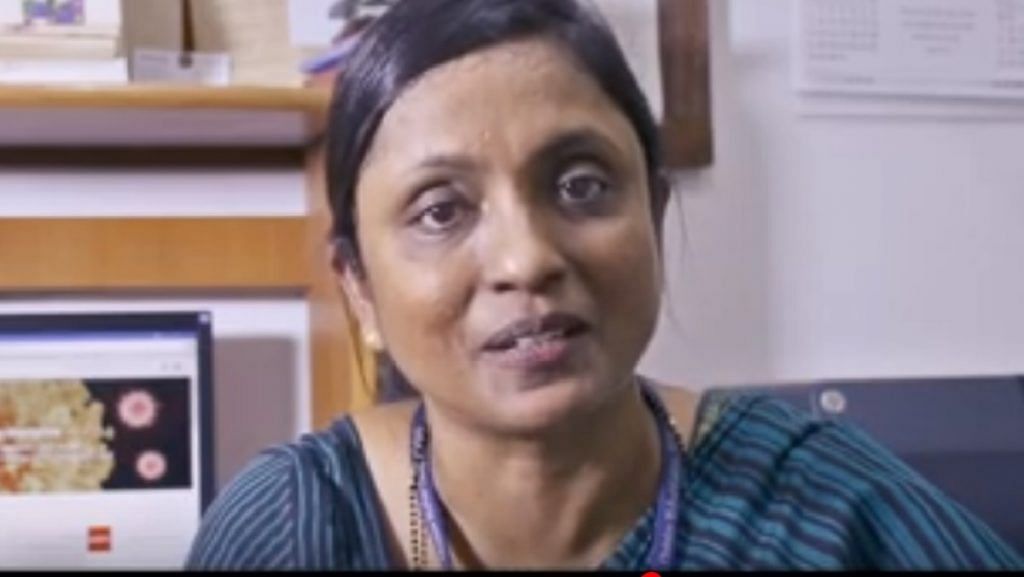New Delhi: The mortality rate for Covid-19 in India is lower, compared to countries such as Italy, the UK and Spain, according to Dr Priya Abraham, director of the National Institute of Virology (NIV), Pune.
“… the mortality rate (worldwide) for SARS-CoV-2 is much higher. However, so far in India, it has been 2 per cent to 3 per cent, which is lower than some countries like Italy, UK and Spain,” she told ThePrint.
Abraham, however, said “nobody should underestimate the impact of this virus at this stage”.
The NIV, which had confirmed the first three positive Covid-19 cases in India, is affiliated to the country’s apex health research body, the Indian Council of Medical Research (ICMR).
Initially, it was the only centre that was testing samples for Covid-19. Even now, all the government and private labs are testing samples under the guidance of the NIV.
The NIV director said this virus infection “has ravaged through even developed and less populated nations very rapidly”.
“Everybody should join the war against this agent. This, of course, does not mean creating panic or stigmatising those who are symptomatic or have to be quarantined,” Abraham said.
Also read: Raghuram Rajan says Covid-19 greatest emergency for Indian economy, Urjit Patel advises caution
NIV — the backbone of India’s fight against Covid-19
The NIV reported the first case of coronavirus on 30 January.
It is an apex laboratory, which is responsible for quality control, trouble-shooting and replenishing the stock of reagents — a mixture used for chemical analysis during checking of patients’ samples — in over 140 laboratories across the country.
On the research front, the NIV has published the first electron micrograph of the SARS-CoV-2 from the throat swab of a positive patient.
“We have also been able to isolate the virus in culture which will give us the opportunity to now perform antiviral drug susceptibility testing, make indigenous diagnostic reagents and also work towards the vaccine,” Abraham said.
Last month, the NIV sent six of its staff to Iran to help in checking the samples of Indian pilgrims stranded there.
It also undertook screening of Indian students, who came back from Wuhan, and Indian nationals, who came from the coronavirus-hit cruise ship Diamond Princess in Japan, and those from Italy.
Coronavirus more contagious than H1N1
Abraham said there are some “unknown challenges with this virus”.
“At least for the (H1N1) flu we had an antiviral drug and we could predict the peak season. (But for coronavirus) We do not even know the role of oral-fecal transmission…”
Comparing the novel coronavirus with H1N1, she said the latter was less contagious.
“For the 2009 H1N1 virus, the mean R-nought value was about 1.46. For the SARS-CoV-2, the R-nought value is estimated to be between 2 and 2.5 at the moment.”
R-nought value, which is the basic reproduction figure, is the expected number of individuals who can catch the virus from a single infected person.
‘Next two weeks crucial’
The NIV director said: “Government authorities are closely following the nature of the spread of infection in the country. The next two weeks will be crucial.”
“The decision to extend the lockdown or have a partial lockdown, especially in overcrowded parts of cities, will be the next important decision to make by the competent authorities.”
Despite the several inconveniences caused due to the nationwide lockdown, Abraham advocated its benefits and legal action against the violators.
“We have seen that the countries, which were slower to react, despite having better health systems, are badly hit.”
“The faster we realise that it depends on each one of us to beat this enemy, the better will be the impact of this lockdown. I support the view of those who advocate legal action against violators.”
Abraham further said: “Partial implementation of a lockdown defeats the very purpose of checking a virus’s quick ability to spread. It needs to be obeyed 100 per cent.”
Also read: What happens after you recover from coronavirus? 5 questions answered
